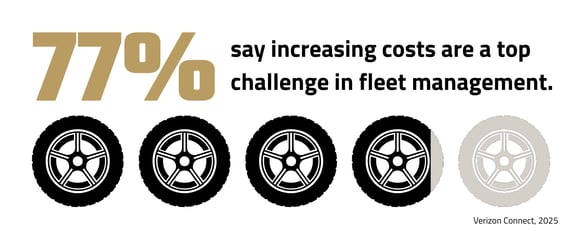If people are the heart and blood of your business, your commercial fleet vehicles are the arteries and veins. Whether your vehicles are used to deliver products, make house calls, or travel to sales meetings, they play a crucial role in getting your people where they need to be — creating business, driving revenue, and keeping your organization healthy.
However, just as a real circulatory system can develop deadly blood clots, your fleet can degrade over time, leading to costly bottlenecks. It’s important to watch for potential problems in your fleet to keep them from getting out of hand down the road. In fact, 77% of respondents in a fleet management survey say combating rising costs is their top challenge. Healthy fleet management practices ensure your system will keep revenue pumping for years. Here are some of the most common mistakes in commercial fleet management.

Failing to Track Vehicle Use
Fleet vehicles are a substantial investment for any business, both in upfront cost and in fuel and maintenance costs. Unfortunately, many organizations fail to adequately monitor vehicle use, simply writing off various expenses as costs of a fleet-centric business. Excess miles, especially if they aren’t business related, stack up and continually drive up operational costs.
Relying on the Honor System
Many businesses practice an honor system when it comes to key management. They expect employees to report vehicle access via manual logs. The honor system often puts too much responsibility in the hands of employees who are prone to mistakes and aren’t immediately concerned with your overall costs. You can always assign key management to an individual employee, but that has its own drawbacks since checking out keys will inevitably take that employee away from their core tasks.
Not Getting Buy-In
When businesses do implement key management policies and procedures — whether with manual logs, a key administrator, or an electronic key control system — employees must commit to using them. If managers don’t hold employees accountable and enforce policies and procedures, they run the same risks as not having controls at all.
Ignoring Training Opportunities
One way to help drive buy-in on new processes is to ensure staff are well-trained on policies and procedures. Failing to take advantage of training opportunities will create a snowball effect where employees continually make mistakes in manual logs, find ways around key administrators, or simply use hardware incorrectly.
How to Protect Your Fleet Keys
Your fleet vehicles are important to your business, and so is how you manage the keys to your vehicles. It’s critical to track how vehicles are being used, enforce vehicle and key management practices, and regularly train staff on procedures. But if manual logs and human administrators are prone to mistakes, how can you ensure your keys are protected?
Consider an electronic key management system that automates key control processes and holds employees accountable. Employees should only be able to access the system with individual credentials, such as a password, fingerprint, or fob. The system them logs exactly who checked out a key and when.
To enhance your fleet management, require staff to input vehicle mileage when returning keys. An automated system ensures an accurate audit trail and allows staff to quickly return to their job duties, avoiding delays associated with completing manual logs or tracking down keys.
Taking care of your fleet vehicles and their keys is critical to keeping the heart of your business beating strong for decades. Are you making healthy fleet management decisions?


